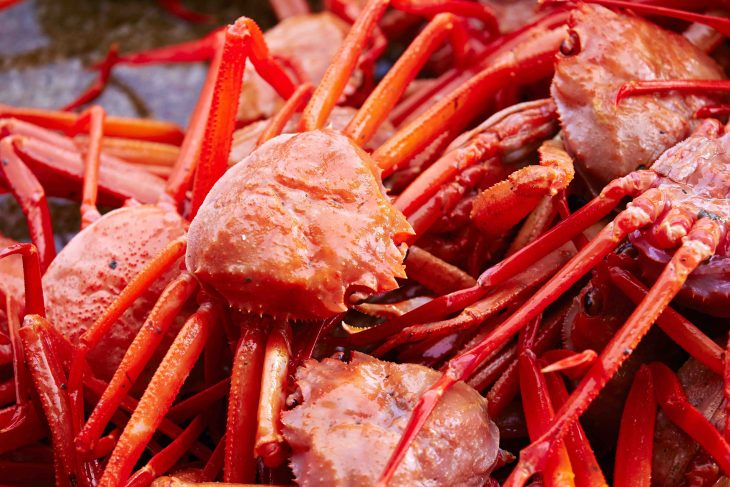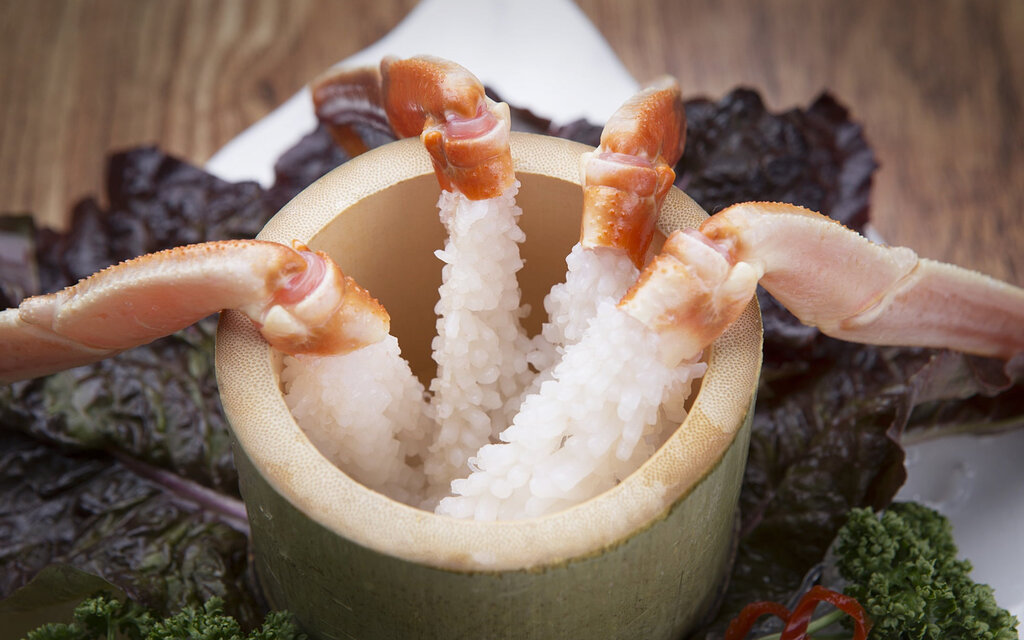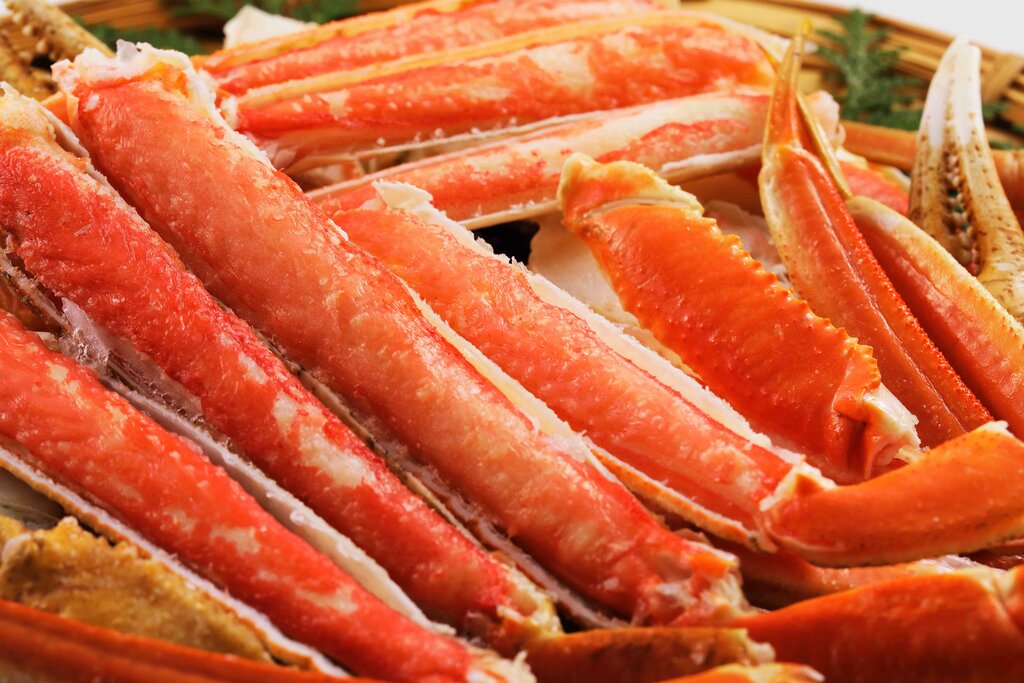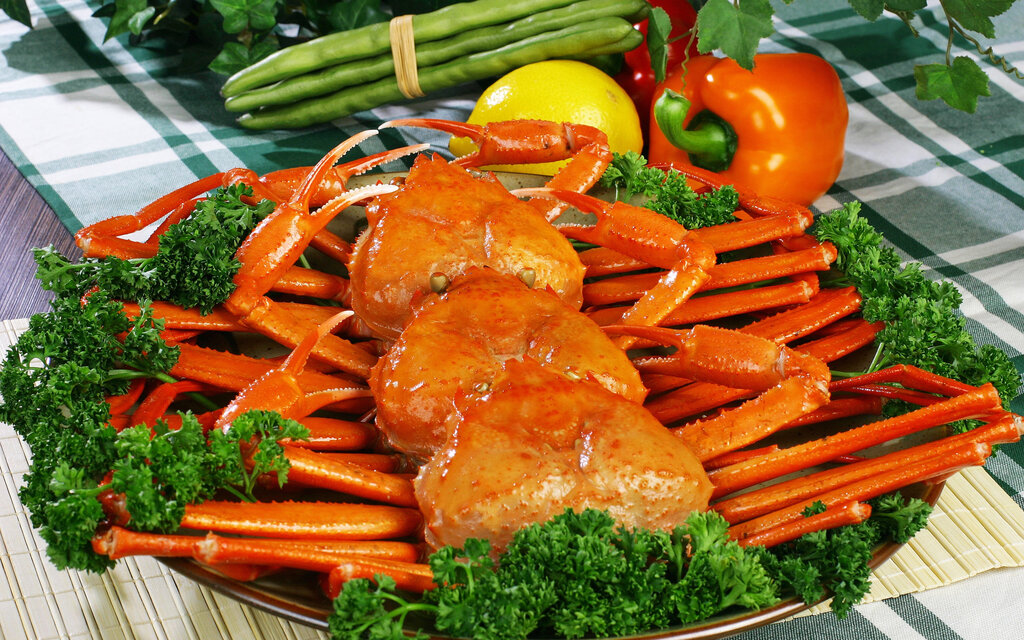
Imagine a delectable seafood feast that not only satisfies your taste buds but also nourishes your body with essential nutrients. Snow crab, with its succulent meat and delicate flavor, offers just that. In this comprehensive article, we’ll delve into 19 fascinating snow crab nutrition facts that will make you appreciate this culinary treasure even more. So, let’s dive in and explore the health benefits of this delightful crustacean.
But First, What Are Snow Crabs?
Snow crabs are a species of crab found in the cold waters of the northern Atlantic and northern Pacific oceans. It is highly prized for its sweet and delicate meat, making it a popular choice in seafood cuisine.
Snow crabs have a distinctive appearance with long, spindly legs and a relatively small body compared to other crab species. They are known for their reddish-brown to purplish color and can grow up to 6 inches in shell width. The name “snow crab” originates from the snowy-white appearance of their meat.
Protein Powerhouse
Snow crab is a fantastic source of protein, making it an excellent choice for individuals looking to meet their dietary protein needs. Protein is crucial for muscle growth, repair, and overall cellular function.
Rich in Omega-3 Fatty Acids
Omega-3 fatty acids are essential for maintaining heart health and promoting brain function. Snow crab is a good source of these beneficial fats, which have been linked to reducing inflammation and improving cognitive function.
Low in Fat, High in Flavor
When it comes to indulging in delicious seafood, snow crab offers a guilt-free experience. It is naturally low in fat, making it a lighter option compared to other protein sources. Yet, it doesn’t compromise on taste, with its sweet and delicate flavor profile.

Excellent Source of Vitamins and Minerals
Snow crab is packed with vitamins and minerals that contribute to overall health and well-being. It contains essential nutrients such as vitamin B12, vitamin C, zinc, copper, and selenium, which play vital roles in various bodily functions.
Vitamin B12 Boost
Vitamin B12 is crucial for red blood cell production, nerve function, and DNA synthesis. Snow crab is a fantastic natural source of vitamin B12, making it a valuable addition to a well-rounded diet.
Supportive of Healthy Bones
Calcium and phosphorus are essential minerals for maintaining strong and healthy bones. Snow crab provides a good amount of these minerals, making it a beneficial choice for supporting bone health.
Promotes Heart Health
Snow crab’s nutrient composition, particularly its omega-3 fatty acids, contributes to heart health. Omega-3s have been associated with lowering cholesterol levels and reducing the risk of heart disease.
Immune-Boosting Selenium
Selenium is an important mineral that supports immune function and acts as an antioxidant in the body. Snow crab contains significant amounts of selenium, making it a natural ally for bolstering your immune system.
Hydration Support
Staying hydrated is essential for overall health, and snow crab can help with that. It contains a high water content, contributing to your daily hydration needs.
Low in Calories
For those watching their calorie intake, snow crab is a wonderful choice. It is relatively low in calories compared to many other protein sources, allowing you to enjoy a satisfying meal without worrying about excessive calorie consumption.
Source of Iron
Iron is vital for carrying oxygen throughout the body and maintaining healthy red blood cells. Snow crab provides a good amount of iron, which is especially important for individuals with iron-deficiency anemia.

Rich in Antioxidants
Antioxidants help protect the body against damage from harmful free radicals. Snow crab contains antioxidants like vitamin C and selenium, which contribute to reducing oxidative stress and promoting overall health.
Supports Healthy Skin
The nutrients found in snow crab, including omega-3 fatty acids, vitamin C, and selenium, can contribute to healthy skin. These nutrients play a role in collagen production, skin cell regeneration, and protection against environmental damage.
Low in Mercury
Concerns about mercury levels often arise when consuming seafood. The good news is that snow crab is considered a low-mercury seafood option, making it safe for regular consumption.
Boosts Energy Levels
With its protein content and rich nutrient profile, snow crab provides a sustainable source of energy. Including it in your meals can help you stay energized throughout the day.
Essential for Pregnancy
Snow crab can be a valuable addition to a prenatal diet. Its nutrients, such as vitamin B12 and omega-3 fatty acids, are essential for fetal brain development and overall maternal health.
Versatile Culinary Delight
Snow crab’s tender and flavorful meat lends itself to a variety of culinary preparations. Whether enjoyed steamed, boiled, grilled, or incorporated into dishes like salads or pasta, snow crab brings a delightful touch to any meal.

Sustainable Seafood Option
Sustainability is an important consideration when it comes to seafood consumption. Snow crab from well-managed fisheries is considered a sustainable choice, ensuring the preservation of marine ecosystems for future generations.
Delight in the Experience
Beyond its nutritional value, enjoying snow crab is a sensory experience. Crack open the shells, savor the tender meat, and relish the satisfaction of indulging in a delicious seafood treat.
Final Thoughts
Snow crab is not only a culinary delight but also a nutritional powerhouse. From being an excellent source of protein and omega-3 fatty acids to providing essential vitamins and minerals, snow crab offers a range of health benefits. So go ahead and treat yourself to this delectable crustacean, knowing that you’re nourishing your body with every succulent bite.
Frequently Asked Questions (FAQs)
Is snow crab safe for individuals with shellfish allergies?
Individuals with shellfish allergies should exercise caution when consuming snow crab or any other type of shellfish. It is always best to consult with a healthcare professional for personalized advice.
How can I cook snow crab at home?
Snow crab can be prepared in various ways, such as steaming, boiling, or grilling. To steam snow crab, simply place the crab legs in a steamer basket over boiling water and cook for about 6-8 minutes until heated through. Serve with melted butter or your favorite dipping sauce.
Can I freeze snow crab?
Yes, snow crabs can be frozen for later use. Ensure the crab is properly cleaned and cooked before freezing. Store in airtight containers or freezer bags, and consume within a few months for the best quality.
How can I tell if a snow crab is fresh?
When purchasing snow crabs, look for bright and shiny shells, with no signs of discoloration or odor. The meat should be firm and white or light pink in color.
Can I enjoy snow crab if I’m watching my sodium intake?
Snow crab naturally contains sodium, although the exact amount can vary. If you’re monitoring your sodium intake, it’s best to consume snow crab in moderation and consider adjusting other components of your meal to maintain a balanced diet.
Was this page helpful?
Our commitment to delivering trustworthy and engaging content is at the heart of what we do. Each fact on our site is contributed by real users like you, bringing a wealth of diverse insights and information. To ensure the highest standards of accuracy and reliability, our dedicated editors meticulously review each submission. This process guarantees that the facts we share are not only fascinating but also credible. Trust in our commitment to quality and authenticity as you explore and learn with us.
